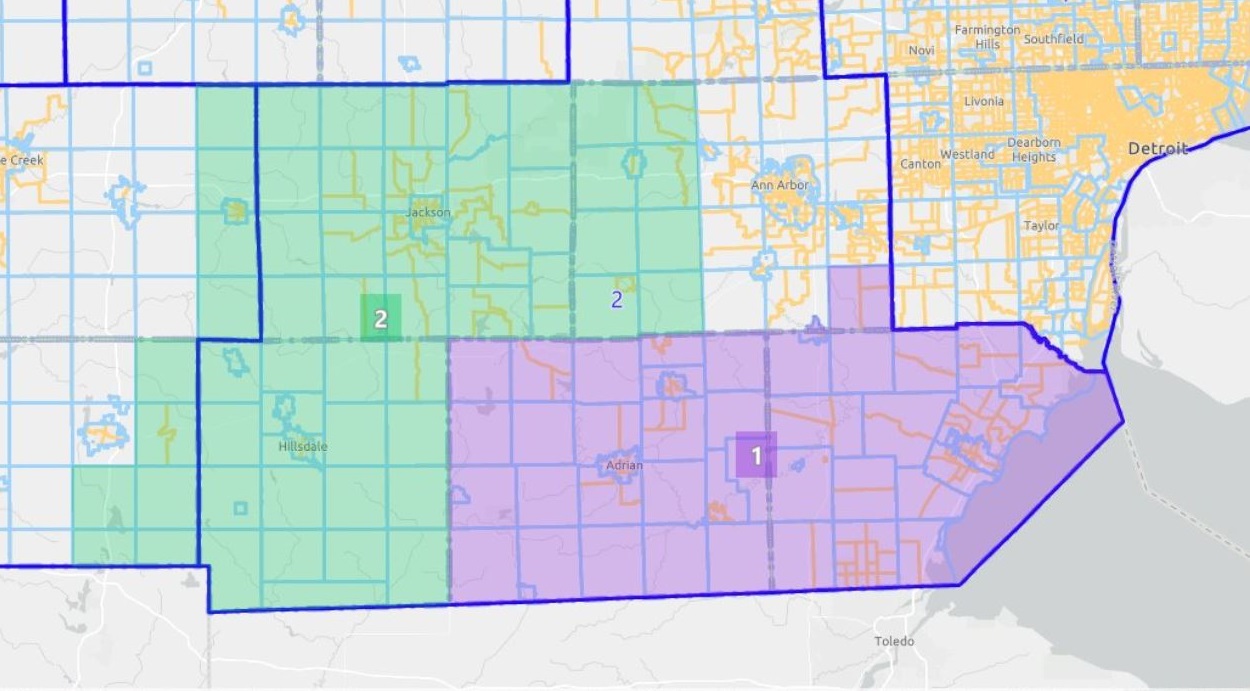What We’re Learning As Michigan Redistricting Commission’s First Political Maps Take Shape
Lines are being drawn for the first time since the Michigan Independent Citizens Redistricting Commission began its work over a year ago.

For the first time, an independent redistricting commission is redrawing Michigan’s political maps. In the past, the state Legislature would draw those lines, a process that drew widespread criticism as a way for politicians to choose their voters instead of the other way around. Now, we’re seeing the very first maps coming out of the work being done by the new Michigan Independent Citizens Redistricting Commission.
As part of the weekly series MichMash, Jake Neher talks with Gongwer reporter Ben Solis, who has been following the redistricting commission’s work closely.
Subscribe to MichMash on iTunes, Spotify, Google Podcasts, NPR One or wherever you get your podcasts.
“We are headlong into the mapmaking process. It’s been about about a year since they’ve started. And now they are finally into the nitty gritty of actually drawing these maps,” says Solis. “They’re simultaneously building two state Senate maps while drawing also one state House map.”
There were some raised eyebrows when the first districts started to take shape this month, in part because they appear to favor Republicans. Democrats have long assumed an independent redistricting process would favor their party’s interests compared to a process spearheaded by the Republican-led state Legislature.
“What’s very interesting about this is that the way that the maps are being built right now, by population, if it continues on the track that it’s on, a couple of observations people have made is that with population density, it looks like these maps are very, very, very leaning Republican, and the Republicans could get a lot of value from these maps, and maybe not so much the Democrats.”
Had some folks ask about the trio of state House districts drawn in (and splitting up) the Lansing metro area. Here’s a better look at what @RedistrictingMI did there. See also the Ann Arbor area map that split AA/Ypsi in a similar way. https://t.co/DNFSduTF9a pic.twitter.com/LJH6SPOUHM
— Ben Solis (@bensolis1) August 25, 2021
But Solis says it’s probably too early to come to any conclusions about what the final districts will look like when the process is all said and done. He notes that the commission is not yet drawing these lines with consideration for some constitutionally mandated criteria, including “communities of interest.”
“And I think that once they get done with their population maps, they’re simply going to have to just redo most of their work,” says Solis. “A lot of what is already on the table and is on the map board might get redrawn simply from a partisan fairness aspect. And then also when you’re considering all the community of interest stuff.”
Related: Redistricting Commission Needs Michigan Residents’ Help To Define “Community of Interest”
“Certainly, there’s a lot more work to do and a lot more to consider,” he continues. “So, I caution people getting too into the weeds on the maps that are present and available right now, because they’re just subject to change.”
Another major difference in this process compared with redistricting efforts in the past is the “sunshine” involved — each step is done out in the open with the public invited to take part.
“Their choices are live in real time, there’s public comment that’s going on,” says Solis. “And in the chat underneath their YouTube stream, people on social media are commenting on it, at the same time, and I’ve seen instances where some social media-savvy commissioners are in the meeting kind of like tweeting and reacting to what people are saying in real time as well while they’re drawing maps. So it’s this weird kind of collaborative process for them, but also for us, because we get to see what they’re doing.”
More from MichMash:
Redistricting Commission Needs Michigan Residents’ Help To Define “Community of Interest”
Michigan’s Petition Initiative Process Is A Mess
Solutions for Worsening Plastic Pollution in Great Lakes: “It’s Not Enough Just to Pick Up Trash”
Infrastructure Bill May Help Address Flooding in Michigan, But Only If There’s a Plan, Dingell Says
Trusted, accurate, up-to-date.
WDET strives to make our journalism accessible to everyone. As a public media institution, we maintain our journalistic integrity through independent support from readers like you. If you value WDET as your source of news, music and conversation, please make a gift today.
